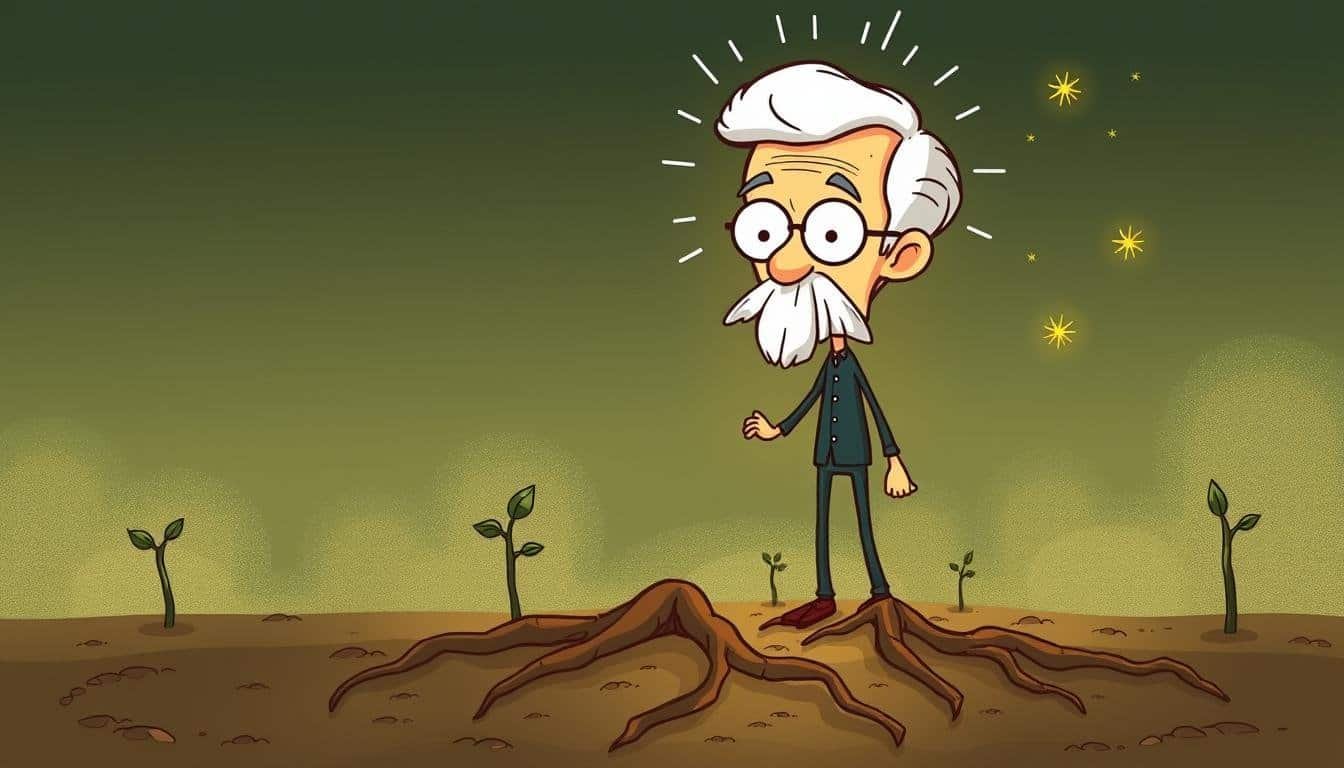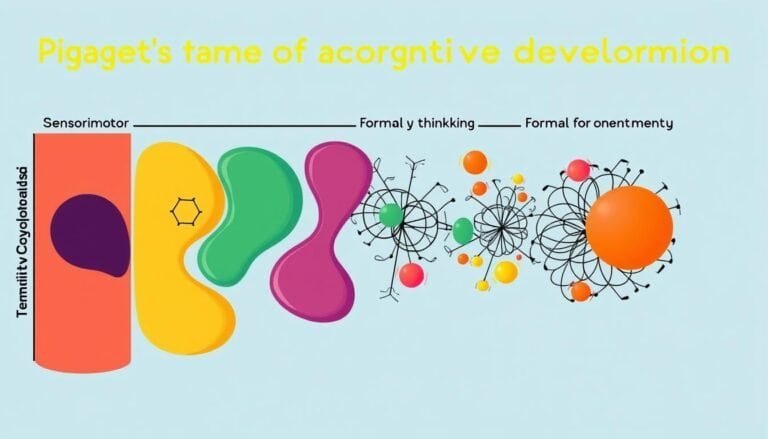William James: Habits and the Power of the Mind
“The greatest discovery of my generation is that human beings can alter their lives by altering their attitudes of mind.” – William James
William James was a key figure in psychology and philosophy. He explored how our habits and mental strength are connected. His work changed how we see human behavior and thinking.
James talked about how habits shape our daily lives. He showed how starting with good habits early helps us think better and make decisions. His ideas have shaped how we study human behavior and thinking.
In “Habit,” published in 1887, James talked about education’s role in shaping habits. He gave three tips for forming good habits and growing as a person. These tips help us improve ourselves and grow.
Let’s explore James’s ideas on psychology, habits, and the mind’s power. Join us to discover how to use your habits for personal change.
Introduction to William James and His Psychological Insights
William James was born in 1842 and changed American psychology and philosophy. His work started modern studies on the mind and how we form habits. He used his own life and deep thoughts to shape these fields.
A Life Devoted to Understanding the Mind
James started his psychology journey with his own battles. He faced depression and neurasthenia early on. These struggles made him want to understand the human mind better.
He found comfort in philosophy, which shaped his new ideas in psychology.
Contributions to Psychology and Philosophy
James connected psychology and philosophy in his work. His book “Principles of Psychology” has inspired many researchers. He introduced the idea of the stream of consciousness and the importance of our own experiences.
He also showed how our thoughts shape our actions. His ideas on forming habits are still important today.
Impact on Understanding Habits and the Mind
James’s ideas on habits are still used today. He showed how our thoughts and attitudes change our lives. His work on cognition and emotion helped shape modern studies.
His focus on personal experiences made him stand out.
“The greatest discovery of my generation is that human beings can alter their lives by altering their attitudes of mind.” – William James
William James’s work still affects psychology, philosophy, and cognitive science. His unique approach has opened new ways to understand us and our behaviors.
The Nature of Habit According to William James
William James was a leading psychologist and philosopher. He explored the idea of habitual behavior deeply. His work shows how our lives are molded by the patterns we follow every day.
James’s Definition of Habit
James saw habits as automatic actions that come from repeating them. He thought that we are all made up of habits, some natural and others learned. This mix of nature and nurture shapes our actions.
The Physiological Basis of Habits
James looked at habits from a physical point of view. He said they are like paths in our nervous system. He believed that our brain can change and make new connections based on what we do and experience.
How Habits Shape Our Daily Lives
James thought habits are very important in our daily lives. They make things easier, help us work better, and keep society running smoothly. He said habits affect our thoughts, actions, and choices a lot. He even called them the “flywheel of society,” keeping us in our roles and norms.
“Habit is thus the enormous flywheel of society, its most precious conservative agent.”
James’s ideas about habits still shape how we see human behavior today. His insights into habits give us new ways to think about personal growth, how society works, and the power of our minds in shaping our lives.
The Concept of Plasticity in James’s Work
William James introduced the idea of plasticity in his work on habits. This idea helped shape our modern understanding of how our brains change and adapt. He saw plasticity as the ability of a structure to change while still keeping its main form.
James was inspired by French philosopher Léon Dumont’s thoughts on habit. Dumont used examples like clothes fitting a body to show how habits form over time. These examples helped James understand how our brains can adapt to new habits.
Today, the idea of plasticity in forming habits has changed how we see neuroscience and psychology. It tells us how our brains change when we keep doing things. This knowledge is vital for making new habits or breaking old ones.
“Plasticity in the brain is the possession of a structure weak enough to yield to an influence, but strong enough not to yield all at once.” – William James
James’s work on plasticity led to modern studies on neuroplasticity. This area looks at how our brains change because of our experiences. It helps us understand how to make positive changes in our lives.
| Concept | Definition | Relevance to Habit Formation |
|---|---|---|
| Plasticity | Ability to yield to influence while maintaining integrity | Explains how habits form and change over time |
| Neuroplasticity | Brain’s ability to change in response to experience | Supports learning and cognitive flexibility |
| Habit | Repeated behavior that becomes automatic | Result of plasticity in neural pathways |
William James: Habits and the Power of the Mind
William James was a key figure in psychology. He looked closely at how habits and mind power are linked. He showed us how our daily actions affect our mental strength and how our brains grow.
Habits and Mental Power
James thought that good habits make room in our minds for deeper thinking. By making simple tasks automatic, we can use our minds for harder problems. This shows how important habits are for growing our brains.
Habit Formation and Mental Strength
James said being consistent is key to building mental strength. He believed that starting good habits takes effort at first but pays off big in the long run. This helps our brains grow and makes us stronger mentally.
Repetition: Shaping the Mind
James saw repetition as vital for changing our minds. Doing things over and over makes our brain paths stronger, making us better thinkers. This idea fits with what we now know about how our brains change and grow.
“The greatest thing in all education is to make our nervous system our ally instead of our enemy.” – William James
| Habit Type | Impact on Mind Power | Effect on Cognitive Development |
|---|---|---|
| Positive Daily Routines | Increases focus and efficiency | Enhances overall mental performance |
| Learning New Skills | Expands mental capacity | Promotes neuroplasticity |
| Mindfulness Practices | Improves emotional regulation | Boosts attention and memory |
The Importance of Early Habit Formation
William James said early habits are key to growing and developing as kids. He thought the first 20 years of life are vital for setting habits that last a lifetime. This idea matches what we know today, showing habits make up a big part of our daily life.
About 43% of what we do every day is done on autopilot, often without even thinking. This shows how powerful habits are in shaping our lives early on. The brain’s basal ganglia are key in making these habits, starting and ending our routines.
James believed that habits formed in youth, like how we speak and act, shape our character and future success. This idea is backed by today’s research on forming habits:
- It takes an average of 66 days to establish a new health-related habit
- Stress levels significantly influence the development of negative habits
- Mindfulness can aid in breaking undesirable habits
These facts show why it’s key to encourage good habits early on. Parents and teachers are vital in helping kids develop habits that help them grow and succeed over time.
“The period below twenty is the critical one in the formation of intellectual and professional habits.” – William James
Knowing how habits form helps us support kids better and lay the groundwork for positive behaviors throughout their lives.
Habit as a Conservative Force in Society
William James was a key figure in social psychology. He saw habits as key to keeping society stable. His ideas show how our shared habits shape our actions and keep society in order.
The Societal “Flywheel”
James compared habits to a big flywheel that keeps society moving smoothly. This idea shows how our habits and norms keep things steady. They stop big changes and keep things as they are.
Maintaining Social Order
Habits are vital for keeping society in order. They guide how we act every day, stick to cultural norms, and make social situations predictable. This predictability lets society work well, with people acting in familiar ways.
Drawbacks of Ingrained Habits
But habits also have downsides. Deep-seated norms can keep inequality going or block needed changes. James saw the good and bad sides of habits. He knew they could help or hinder progress in society.
| Positive Aspects | Negative Aspects |
|---|---|
| Maintains social stability | Can perpetuate inequality |
| Ensures predictable behavior | May resist necessary changes |
| Facilitates smooth social interactions | Can lead to societal stagnation |
James’s view on habits as a conservative force in society is still important today. It makes us think about our habits and norms. We need to balance stability with progress and fairness.
The Role of Education in Habit Formation
Education is key in shaping habits and helping our brains grow. William James thought the main aim of school should be to make our brains our allies. Today, experts agree that making learning positive helps our minds grow.
Studies show that teaching students about habits can really help them do better in school. A 2005 study looked at 164 8th graders and found that those with strong willpower did better in school and chose better colleges. Willpower was even more important than IQ, with top students scoring 210 points higher on the SAT.
Schools can use special methods to help students learn and form good habits. For instance, Starbucks uses the LATTE method (Listen, Acknowledge, Take action, Thank, Explain) to help employees stay focused under pressure. This could work in classrooms to help students control themselves and learn better.
Letting students have more control over their learning can increase their willpower and work ethic. A study in an Ohio factory found that giving workers more freedom led to a 20% jump in productivity in just two months. This idea could make students more engaged and successful in school.
By using insights from educational psychology, teachers can make learning more effective. This supports brain growth and helps students develop good habits.
James’s Maxims for Developing Good Habits
William James was a leader in self-improvement and personal growth. He came up with important ways to form good habits. His ideas still help us understand how to build habits and get mentally strong.
The Power of Strong Initiative
James said starting new habits with determination is key. He thought starting strong helps you succeed. This idea matches today’s focus on personal growth and staying committed from the start.
Consistency is Key
James believed in never making exceptions with habits. He said being consistent is vital for making new behaviors stick. This idea fits with today’s self-improvement methods that highlight the importance of daily routines.
Seizing Opportunities
James suggested taking action on your resolutions right away. He thought every action makes the habit stronger. This active way of growing personally is still useful in our busy lives.
| James’s Maxim | Modern Application |
|---|---|
| Strong Initiative | Setting clear goals and action plans |
| No Exceptions | Using habit tracking apps for consistency |
| Seize Opportunities | Mindfulness practices for awareness |
James’s advice on forming good habits is a strong base for personal growth. By using these ideas, people can improve themselves and grow personally for the long term.
Breaking Bad Habits: Insights from William James
William James, a leading psychologist, found that about 43% of our actions are automatic. This shows how crucial it is to know how to break bad habits. James understood the hard part of changing deep-rooted behaviors and shared key insights on changing our ways.
James believed in quickly picking up new habits when you can. He emphasized the importance of sticking to new habits and not making excuses. He said that giving in once could set back a lot of progress in changing our minds.
Today, studies back up James’s ideas. A study on eating habits shows how hard it is to change. Even though many know they should eat more fruits and veggies, only a few Americans do.
“The great thing in all education is to make our nervous system our ally instead of our enemy.” – William James
James’s thoughts match modern ways of building habits. Charles Duhigg, in “The Power of Habit,” talks about changing the action linked to a trigger but keeping the trigger and reward the same. This method can help break bad habits.
| Habit Breaking Strategy | Description | Effectiveness |
|---|---|---|
| Abrupt Acquisition | Suddenly adopting a new habit | High, if feasible |
| Persistence | Consistently maintaining new behavior | Critical for success |
| Avoiding Exceptions | Not allowing lapses in new behavior | Prevents undoing progress |
| Ritual Modification | Changing associated behaviors | Effective for long-term change |
Conclusion
William James changed how we see the human mind with his work in psychology and cognitive science. His book, “Principles of Psychology,” is a huge work with 1400 pages. It gives deep insights into how we think, pay attention, and form habits.
James taught us how to improve ourselves with his ideas on habits and mental strength. Many people have used his ideas to grow personally. He showed how to use physical methods for emotional healing and helped create Alcoholics Anonymous.
Today, James’s ideas are still important in science and everyday life. His way of studying spiritual experiences connects with people who are spiritual but not religious. He moved from believing in a set destiny to believing in our free will and consciousness. This inspires people to use their minds for good.
Source Links
- William James on the Psychology of Habit
- William James
- The Psychological Roots of William James’s Thought
- William James and British thought: then and now
- Classics in the History of Psychology — James (1890) Chapter 4
- untitled
- William James on the Psychology of the Second Wind and What Enables Us to Transcend Our Limits
- Avoiding Old-Fogeyism: Plasticity, Habits of Genius, and Acts of Greatness
- The Aristotelian conception of habit and its contribution to human neuroscience
- Pioneering Psychologist William James on Attention, Multitasking, and the Mental Habit That Sets Great Minds Apart
- Habit (James 1914) – Wikisource, the free online library
- How Are Habits Formed? The Psychology of Habit Formation
- Habit formation
- James_Habit
- Habit
- contents
- The Power of Habit by Charles Duhigg – Summary and Notes – Thomas Frank
- Habit, Education, and the Democratic Way of Life: The Vital Role of Habit in John Dewey’s Philosophy of Education
- Classics in the History of Psychology — James (1890) Chapter 11
- William James
- Can Brain Science Help Us Break Bad Habits?
- Why We Get Stuck in Bad Habits and How to Break The Habit Loop
- William James on the Mind and Its Fringes
- William James on living life as if it mattered — Philosophy for Life







